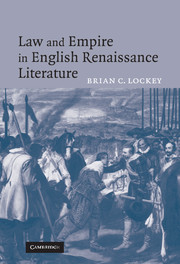Book contents
- Frontmatter
- Contents
- Acknowledgments
- Introduction: Romance and the ethics of expansion
- PART I ROMANCE AND LAW
- PART II THE PREROGATIVE COURTS AND THE CONQUEST WITHIN
- 5 Historical contexts: common law, natural law, civil law
- 6 Roman Conquest and English legal identity in Cymbeline
- 7 Love's justice and the freedom of Brittany in Lady Mary Wroth's Urania part I
- Conclusion: English law and the early modern romance
- Index
7 - Love's justice and the freedom of Brittany in Lady Mary Wroth's Urania part I
Published online by Cambridge University Press: 22 September 2009
- Frontmatter
- Contents
- Acknowledgments
- Introduction: Romance and the ethics of expansion
- PART I ROMANCE AND LAW
- PART II THE PREROGATIVE COURTS AND THE CONQUEST WITHIN
- 5 Historical contexts: common law, natural law, civil law
- 6 Roman Conquest and English legal identity in Cymbeline
- 7 Love's justice and the freedom of Brittany in Lady Mary Wroth's Urania part I
- Conclusion: English law and the early modern romance
- Index
Summary
Most recent scholarship on Lady Mary Wroth has focused on the gender politics of her writings. Such a focus, however, may inadvertently serve to limit and circumscribe a writer such as Wroth as an authority only when it comes to topics having to do with a narrow definition of gender. The approach which I have taken throughout this book is in part meant to resist the temptation to present romance fictions that are putatively addressed to female readers – or authored or translated by female writers – as essentially feminine texts. The dangers of such a labeling are twofold. First, it may unintentionally reinforce and reproduce in modern criticism Renaissance attempts to marginalize romances by presenting them either as dangerously feminine or simply as frivolous, unserious, and digressive works of fiction. Secondly, it may wrap women and romance into a neatly enclosed domestic space, safely shut in from the “serious” matters which exist outside of the domestic realm. In the process, it risks further marginalizing Renaissance women as capable only of reading and understanding fiction that is in turn defined as exclusively about gender.
This last chapter considers how the issues of conquest and transnational justice considered in earlier works and the topic of gender are not necessarily mutually exclusive. As we shall see, romances are often unique in presenting narratives about marriage and domestic conflict while simultaneously engaging with and defining England's national identity as well as its relation to national, religious, and ethnic figures of otherness.
- Type
- Chapter
- Information
- Law and Empire in English Renaissance Literature , pp. 187 - 218Publisher: Cambridge University PressPrint publication year: 2006



